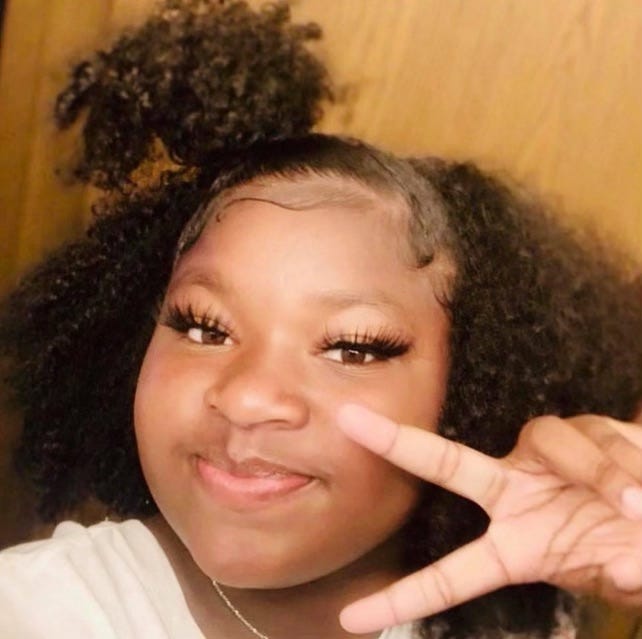The conviction of George Floyd’s killer was supposed to be a turning point. Yet at the same moment we sat waiting for the verdict, violence against Black people continued. This time, the violence was directed at a girl. She was not the first.
December 28, 1993. In the early morning hours, 19-year-old Tyisha Miller of Rubidoux, California, was driving her aunt’s car, accompanied by a 15-year-old friend. The tire went flat, and a passing stranger stopped to help. Noticing the spare tire was also flat, the man led them to a gas station. When the spare would not inflate, the man drove the 15-year-old home to get family assistance. Tyisha waited in the car, falling asleep with the engine running and radio on. When family arrived, they noticed Tyisha was unresponsive and foaming at the mouth, with a semi-automatic pistol in her lap (likely for protection due to the late hour). Within minutes, four officers arrived and approached the vehicle with guns drawn. They broke a side window to get into the car, believing that Tyisha needed immediate medical attention. Tyisha was startled awake, reaching for her gun at the same moment a police officer tried to remove it. Police immediately opened fire, fatally striking Tyisha twelve times. Later, it was discovered that Tyisha had not been awake, as she was under the influence of drugs, and police recanted their version of events. The four police officers were never prosecuted.
May 5, 2003. While riding in her friend’s car, police pulled them over. The driver had an outstanding warrant and was placed under arrest. 21-year-old Kendra James moved into the driver’s seat. Despite having no probable cause, police attempted to pull Kendra from the vehicle as well. According to police testimony, Kendra would not comply. Officer Scott McCollister held a gun to Kendra’s head and fired a single, fatal shot. The officer was cleared of all criminal charges.
August 18, 2006. While in Greenwich Village, New York City, seven young Black women identifying as lesbians were walking down the street when a male bystander sexually propositioned one of them, stating “I’ll fuck you straight, sweetheart!”. The man, Dwayne Buckle, refused to take “no” for an answer, and physically assaulted them. He pulled the dreadlocks from one’s hair, burned another with a cigarette, and choked a third. The women acted in self-defense,, and police were called to the scene. Four of the women – including 19-year-old Venice Brown, 20-year-old Terrain Dandrige, and 20-year-old Patreese Johnson – were charged with Gang Assault in the 2nd degree and received sentences ranging from 3.5 to 11 years in prison. The presiding judge, Justice Edward J. McLaughlin, stated that the girls should have adhered to the nursery rhyme, “Sticks and stones will break my bones, but names will never hurt me.”
May 16, 2010. Following a murder in Detroit’s east side, police obtained a warrant to search 4054 Lillibridge, a duplex where the murdered was believed to be hiding. The duplex was the home of the murderer’s girlfriend, who lived upstairs, and the girlfriend’s mother and Mertilla Jones, whose 7-year-old granddaughter – Aiyana Jones – was asleep on the couch. Accompanied by a reality television crew, at 12:40 a.m., police fired a flash grenade through the window of the lower apartment. According to reports, within seconds of entering the house, Officer Joseph Weekley fatally shot Aiyana Jones. The officer later claimed that Mertilla had slapped the gun, causing it to fire. Mertilla stated she had been reaching for her granddaughter, because the flash grenade had set Aiyana on fire. Mertilla’s fingerprints were not found on the gun, backing Mertilla’s claim. Despite two attempts at trial, criminal charges against Officer Weekley were dismissed. There was no justice for Aayisha.
November 1, 2014. In Bessemer, Alabama, 18-year-old Sheneque Proctor was arrested for disorderly conduct while at a private party, and she was taken to the city jail. Sheneque suffered from asthma, and informed the police that she was in need of medical care. During a call with her mother, she also relayed that her asthma was acting up after being roughly handled by three police officers and pepper sprayed. Later evidence would also reveal the presence of drugs in her system. The police ignored her requests, and Sheneque was found dead in her cell the next morning. The police department refused to release video surveillance of her cell to the family, claiming she died of a drug overdose. Experts stated that even with the presence of drugs, her death was preventable.
November 22, 2014. During a violent confrontation with police that led to the death of her brother, Tamir (who was playing with a toy gun in a park), 14-year-old Tajai Rice ran to her brother’s side after he was shot. Police tackled the distraught girl, handcuffing her and placing her in a police car.
April 21, 2021. 16-year old Ma’Khia Bryant was living in foster care, where she got into an argument with two other girls – former foster children of Ma’Khia’s foster mother who were visiting the home – about housekeeping and an unmade bed. According to initial reports, the fight escalated and Ma’Khia called 9-1-1 for help at 4:30 p.m. local time. The police responded, and according to initial viewings of the body camera, found Ma’Khia holding a knife and pushing two girls away from her. Officer Woods arrived at 4:44 p.m. Body camera footage shows him getting out of his patrol car mere feet from the fight, walking towards the girls and asking “What’s going on?” As he asks, Ma’Khia pushes a girl to the ground. Simultaneously, the first girl is kept on the ground by a bystander as Ma’Khia turns towards the second girl, who is stumbling back into a parked car. Ma’Khia has her arm raised, knife in hand, as she yells at the girl. Rather than try any form of nonviolent restraint – and without ever touching Ma’Khia or attempting to separate the girls – Officer Woods pulled out his gun, shouted “Get down!” rapidly three times, and shot Ma’Khia, who fell to the ground and died. The total time elapsed was ten seconds – barely enough time to even register that police had arrived. An investigation is ongoing as of time of writing.
These are only the girls listed in the Say Her Name report, which contains the stories of countless other Black women killed by police. Did they need to die? Whether drugs, alcohol, or other circumstances contributed, did they need to die, and did police uphold their oath “to protect and serve” for these Black girls and women?
The answer is no. No, they did not need to die. No, there was no logical reason to respond to these incidents with guns. No, the police did not protect and serve. They assumed, and they killed. And, so far, they have pretty much gotten away with it.
Black Lives Matter and Defund Police are trending movements, but they are words that only scratch at the surface of the embedded racism and gender discrimination prevalent in so much of the world. These terms try to encompass a long history of racial and gender-based violence that disproportionately affects girls and women of color. Hence, the phrases themselves are contentious. But at the heart of these phrases is a call to action, begging us to stop being bystanders and to start standing up for change. Whether that stance is in protests, petitions, discussions, challenging family and friends, or in more emboldened action by taking active roles in our local and national governments, it is time for us all to stand up. We must directly confront the world’s legacies of colonialism, racism, and gender discrimination that embolden police officers – and many others – to “act first” with guns and violence rather than critically think about the situation, attempt non-violent resolutions, and empathize with all parties involved.
Are there situations where “guns first” is warranted? Yes. There is no doubt that such situations exist – but they are extremely rare. According to the American Civil Liberties Union, “Out of the 10.3 million arrests made per year, only 5 percent are for the most serious offenses, including murder, rape, and aggravated assault. These are the ones that truly threaten public safety. The other 95 percent of arrests are for things like traffic violations, marijuana possession, unlawful assembly, and even removing a shopping care from store premises.”
Were any of the stories listed above such violent crimes? No. Unequivocally no. Even in Ma’Khia’s case, there was the potential to stop the fight without fatal harm coming to anyone, and there still exists the possibility that Ma’Khia was acting in self-defense or that other factors about the fight have not yet been revealed.
Instead, these stories are reminders that a reckoning has yet to come – and that girls, especially girls of color, are the victims of our failure to achieve it. As Andrea Ritchie, author of Invisible No More: Police Violence Against Black Women and Women of Color, stated in the New York Times, “This is part of a larger pattern, and if we don’t interrupt the pattern, we’re going to be in this position again and again and again.”
-Tiffany Rhoades
Program Developer



